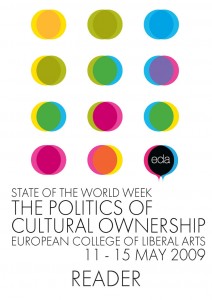 Monday’s theme on restitution was further developed in an afternoon seminar led by Dr. Volker Wiese from Bucerius Law School. The main goal of the seminar was to examine several legal aspects of the restitution of cultural heritage. The discussion centred on the essence, as well as the legal and ethical implications, of the concept lex rei sita, which stipulates that “questions related to the validity of a transfer of personal property are governed by the law of the state where the property is located at the time of the alleged transfer.”
Monday’s theme on restitution was further developed in an afternoon seminar led by Dr. Volker Wiese from Bucerius Law School. The main goal of the seminar was to examine several legal aspects of the restitution of cultural heritage. The discussion centred on the essence, as well as the legal and ethical implications, of the concept lex rei sita, which stipulates that “questions related to the validity of a transfer of personal property are governed by the law of the state where the property is located at the time of the alleged transfer.”
Students, faculty and Dr. Wiese explored how the trade and restitution of culturally significant objects is complicated by the diversity of local laws that concern bona fide purchasers – buyers who acquire a cultural item in accordance with local trade laws and are not aware of the special provenance of the item, which belongs to the cultural heritage of a foreign country. While in Germany, bona fide purchasers become lawful owners as long as the object has not been stolen before, Anglo-American laws do not apply the concept of bona fide acquisition of property at all. On the other end of the legal spectrum, under Italian law bona fide purchasers are honoured even when it becomes known that the property had been stolen before from its original owner. The seminar participants discussed how specific historical and cultural developments in each country might have contributed to the formation of a particular legal view on bona fide purchases. To illustrate the practical significance of the fact that the international community does not have a standardized international framework, Dr. Wise presented several insightful cases where local laws are recognized in the case of a sale even if the cultural item has been abducted from a legal order that does not follow the concept of bona fide purchase, and has been subsequently brought back to that country.
The seminar also considered the issue of declaring cultural objects res extra commercium, which makes the objects themselves non-tradable, and the transfer of their ownership legally void. However, the international treatment of such cases is not uniform, Dr. Wiese pointed out. He first presented a case in Italy, where the courts established that the rule shall be strictly confined to the territory of the original state. In effect, this makes it legally permissible for a cultural object declared res extra commercium in Spain, for example, to be traded in the territory of Italy. Dr. Wiese juxtaposed this case with the ruling of a French court, which argued that the legal nature of a foreign res extra commercium cannot be domestically disregarded.
The seminar scrutinized the soundness of legal rules when applied to the special intellectual context of cultural items, and considered whether and to what extent legal rules can and should reflect intricate ethical judgment and embody changing moral codes. A wide variety of relevant questions were discussed, including whether the law should foster trade with cultural items or embody policies that tie the objects more strongly to their country of origin, and what the implications are for cultural exchange and the preservation of cultural heritage.
Volker Wiese teaches at Bucerius Law School in Hamburg and specializes in restitution policies. He obtained a Master of Laws (LL.M.) from McGill University for his thesis: “A new Approach to the Private International Law of Copyright” and a PhD. from Bucerius Law School in 2005, on “The Influence of European Law on International Property Law pertaining to Cultural Property”.
By Snezhina Kovacheva (‘09, Bulgaria)
